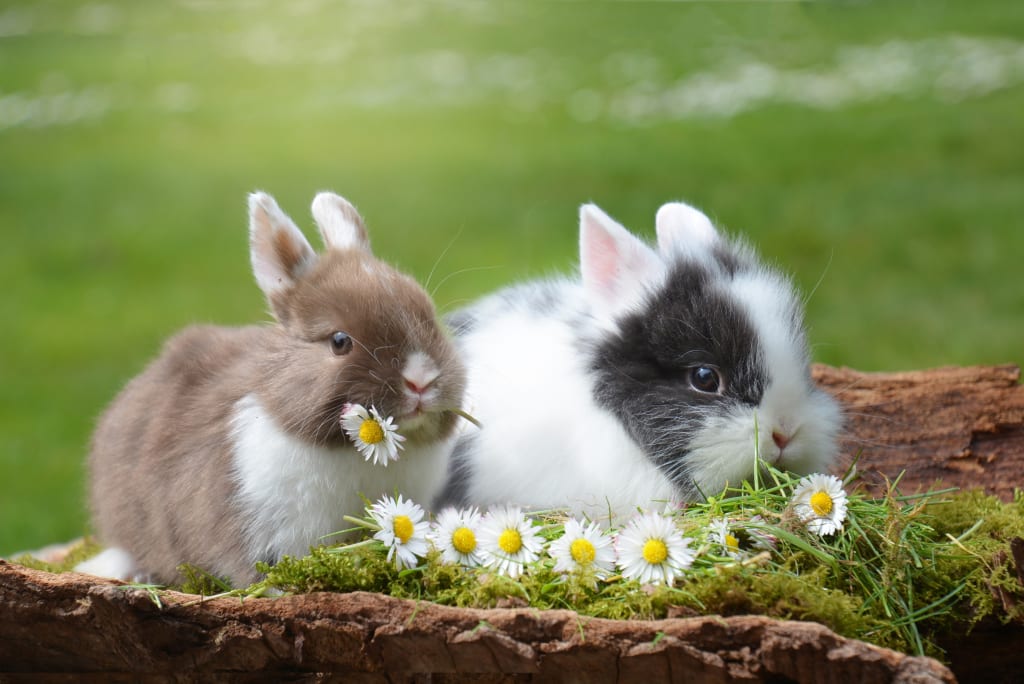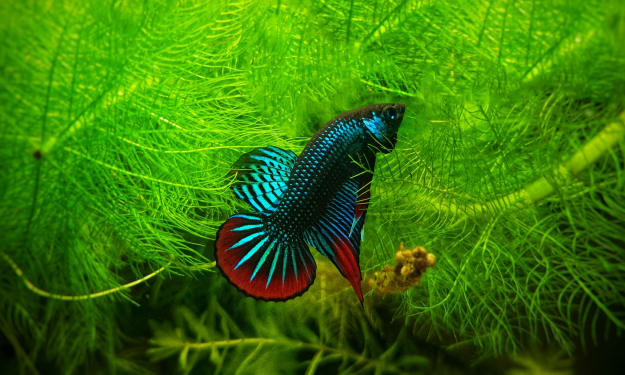
As a cuddly, adorable pet, a rabbit may bring happiness and companionship into your life. To make sure they live a happy and healthy existence, it's crucial to comprehend the special behaviours and wants of pet rabbits if you're thinking about having one. We'll look at all aspects of pet rabbit life in this post, from their diet and habitat to their socialisation and activity requirements.
Diet and Nutrition: The Key to a Healthy Rabbit
Your pet rabbit's health and wellbeing depend on eating a balanced diet. Hay, fresh produce, and water should make up most of a rabbit's diet. Hay is a crucial component of their diet since it supports their digestive and oral health. Fresh vegetables, such bell peppers, carrots, and leafy greens, give rabbits essential vitamins and minerals. To avoid causing digestive problems, it's best to introduce new meals gradually and stay away from giving them items with a lot of sugar.
Rabbits should always have access to clean, fresh water in addition to hay and vegetables. To minimise spilling and tipping, you should give them a sturdy ceramic bowl or a water bottle.
Habitat and Housing: Creating a Safe and Comfortable Home for Your Rabbit
For rabbits to thrive, their living space must be both secure and roomy. The habitat for a rabbit needs to be roomy enough for them to spread out and move around freely, with distinct spaces for feeding, sleeping, and exercise. It's important to keep a rabbit hutch or cage clean, well-ventilated, and free from bacteria and odours.
Rabbits should have regular exercise time outside of their enclosure in addition to a hutch or cage to support their physical and mental health. It's crucial to rabbit-proof your home to protect them from dangers like electrical cables, poisonous plants, and little objects they might eat.
Socialization and Bonding: Building a Strong Relationship with Your Rabbit
Rabbits are gregarious creatures who enjoy company. Building a solid relationship and safeguarding your rabbit's happiness need significant time together. Your rabbit can become more at ease and confident around you with regular touching, grooming, and playfulness.
In order to prevent territorial disputes if you have multiple rabbits, it's crucial to introduce them gradually and give them ample room and nutrients. Your rabbits' aggressive behaviour can be prevented and a peaceful living environment can be promoted by neutering or spaying them.
Exercise and Enrichment: Keeping Your Rabbit Active and Stimulated
Because they are naturally curious, rabbits require regular physical activity and mental engagement to survive. Your rabbit's wellbeing depends on giving him or her opportunities for both mental and physical stimulation. Toys, tunnels, and hiding places can be used to make a special play area for your rabbit to promote exercise and play.
In addition to playing, rabbits should have the chance to dig, burrow, and forage because they are instinctive behaviours that stimulate the mind. You may keep your rabbit mentally engaged and minimise boredom by giving it hay, untreated wooden toys, and puzzle feeders.
Healthcare and Regular Check-ups: Ensuring Your Rabbit's Health and Happiness
The health and pleasure of your rabbit depend on regular medical care and veterinarian examinations. Every year, rabbits should be immunised against common diseases and checked by a licenced veterinarian for any symptoms of illness or discomfort.
Another crucial component of caring for rabbits is grooming. To keep their fur clean, avoid matting, and maintain strong teeth and nails, rabbits require routine grooming. Regular brushing of your rabbit's fur will help remove loose hair and avoid hairballs, which can be harmful if consumed. In order to avoid discomfort and overgrowth, rabbits' nails may need to be regularly trimmed because they can grow swiftly.
Additionally, it's critical to watch out for any symptoms of illness or pain in your rabbit. Being prey animals, rabbits may conceal symptoms of illness, so it's important to be on the lookout for any changes in your rabbit's behaviour, appetite, or general health.
Creating a Bond for Life: The Joy of Owning a Pet Rabbit
It can be a satisfying and rewarding experience to keep a pet rabbit. Rabbits are friendly, perceptive, and intelligent creatures that can develop close relationships with their owners. It takes time and patience to develop a trusting relationship with your rabbit, but the thrill of having a fuzzy friend who depends on you for care and company is truly unique.
Gently stroking, playing, and stimulating your rabbit's mind can all help to develop your relationship and forge a lasting companionship. With the use of positive reinforcement training, rabbits may recognise their owners, respond to their voices, and even pick up new behaviours.
The Importance of Exercise and Enrichment
Because they are busy creatures, rabbits need regular physical activity and mental stimulation to flourish. Your rabbit's physical and emotional health depend on you providing a secure, roomy area for them to hop, run, and explore. Inactivity can cause obesity, muscle wasting, and other health problems in rabbits.
Providing enrichment activities for your rabbit helps keep them cognitively active and minimise boredom in addition to physical activity. To promote natural behaviours like digging, gnawing, and foraging, this can involve offering toys, tunnels, hiding places, and puzzle feeders. Your rabbit can remain interested and entertained by rotating and introducing new enrichment items.
Socialization and Bonding
Since they are sociable creatures, rabbits gain socialisation and bonding from both their human family members and other bunnies. Building a trusting relationship with your rabbit can be facilitated by spending time together, which might include petting, grooming, and gentle handling. The development of fear or timidity in your rabbit can also be avoided with regular engagement.
If you have several rabbits, giving them chances to interact socially can encourage positive social behaviours and lessen the likelihood of violence or loneliness. To avoid territorial disputes or injuries, it's crucial to introduce rabbits to one another gradually and under observation.
Understanding Rabbit Behaviors
As a rabbit owner, it's crucial to comprehend the distinctive behaviours that rabbits exhibit. Rabbits are prey animals, therefore when they sense danger, they may act instinctively by hiding, freezing, or pounding their hind legs. They are expressing their fear or discomfort by doing this.
Rabbits are also known for their chewing behavior, which is a natural instinct for them to wear down their constantly growing teeth. Providing appropriate chew toys and ensuring your rabbit has access to hay or other fibrous materials can help satisfy their chewing needs and prevent dental problems.
Rabbits also communicate through body language, such as ear position, tail movement, and vocalizations. Learning to interpret these cues can help you understand your rabbit's mood and emotions, and respond accordingly to their needs.
Rabbit Health Care
Taking care of your rabbit's health is essential for their well-being. This includes regular visits to a rabbit-savvy veterinarian for check-ups, vaccinations, and dental examinations. Rabbits are prone to dental issues, such as overgrown teeth and dental malocclusion, which can cause pain and discomfort if not addressed promptly.
In addition, rabbits should have a balanced diet that consists of hay, fresh vegetables, and a limited amount of pellets. Avoid feeding rabbits high-sugar or high-carbohydrate foods, as this can lead to obesity and other health issues. Providing clean water in a sipper bottle or a heavy ceramic bowl is also crucial for their hydration.
Conclusion
In conclusion, pet rabbits have specific needs and behaviors that require attention and care. Providing a balanced diet, a safe and enriched environment, regular exercise, socialization, and proper healthcare are essential for their well-being. Understanding their unique behaviors, bonding with them through quality time, and being observant of their health can lead to a happy and fulfilling life for your pet rabbit. With proper care and attention, pet rabbits can bring joy, companionship, and endless love into your life for many years to come.
I hope this article provides you with valuable insights into the world of pet rabbit life. Remember to always do thorough research, consult with a veterinarian, and provide a loving and nurturing environment for your furry friend. Happy rabbit ownership!






Comments
There are no comments for this story
Be the first to respond and start the conversation.